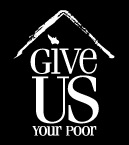According to statistics, I am living way below the poverty line. I might not have known this without those good ol’ numbers. These statistics help me gain a reflection of myself in accordance to a standard of measure I might not have known otherwise.
Homeless? What does that mean? Is it the opposite of “homed?”
I thought I was just like everybody else...I tote around a laptop computer, and a cell phone and I have a taste for triple espressos. But I don’t have one of those roof-topped structures filled with furniture, gizmos, closets, windows and a doorway.
I’m portable.
My ancestors were nomads.
Nevertheless, I’m one of those persons who listens to such descriptive words and attempts to forge them into meaningful thought. When I think of “home,” I imagine a comfort zone wherein one feels most relaxed, at ease and in tune with the immediate environment. I believe that many people feel “at home” for the most part when they are partaking of their most rewarding activity, be it the workshop, the playing field, on stage or quite frequently a particular place of reflection such as a golf course or fishing hole.
If it weren’t for those statistics, I would never have applied the term “homeless” to myself. But a lot of us are getting snared by those numbers as of late. A wave of layoffs and foreclosures has introduced many hard-working people to study up on their couch-surfing skills. Even those with jobs are taking advantage of food banks and thrift stores.
One statistic that does come to mind when trying to get a handle on how times are changing is the fact that a majority of college attendees now return to their parents’ house upon graduation. Does camping out with Mom and Dad absolve the grown child of the negative sting carried by the term “homeless?”
I grew up under the influence of the ‘60s, in the era of “Route 66,” Kerouac’s “Dharma Bums,” and television shows such as “The Fugitive,” where the protagonist could ramble coast-to-coast picking up odd jobs here and there as they explored new vistas while mingling with people and cultures otherwise unknown to them.
We called it “day labor.” Show up in a town someplace, find the nearest factory, farm or warehouse and dig into some up-close-and-personal sweat equity. A day’s work earned a day’s pay, which would usually be enough to buy some food, rent a room and/or buy some gasoline if need be.
The secret was to simply keep going forward, keeping the momentum going and the wind in your sails. If you landed in some miserable sweat shop, then you made the best of it and got the heck out of there. In this manner you learned about those not so lucky, who’d be left behind in the life you’d only had a taste of.
Some would call this a way to learn to “count your blessings.” I just saw it as a reality-based standard of measure. Sort of like a politicians’ breezy “how am I doing?” quip. We can figure it out for ourselves if our eyes are open and our minds free.
“Homeless?” From what angle does it appear that way? Your perspective might not match mine. But that’s okay with me. I’m on the move.
Songwriter, bicyclist, movie extra, photographer, grandfather, deltiologist and coast-to-coast portable man, Delmark Goldfarb is known for his activism and good humor. He founded an annual food drive/music festival now in its twenty-third year (Waterfront Blues Festival), which has raised tons of donated items and millions of dollars for food banks. He is featured in the newly-released jug band documentary "Chasin' Gus' Ghost" and appears on the Give Us Your Poor compilation CD (Appleseed Recordings) accompanied on harmonica by John Sebastian.
Tuesday, May 18, 2010
Subscribe to:
Comments (Atom)


